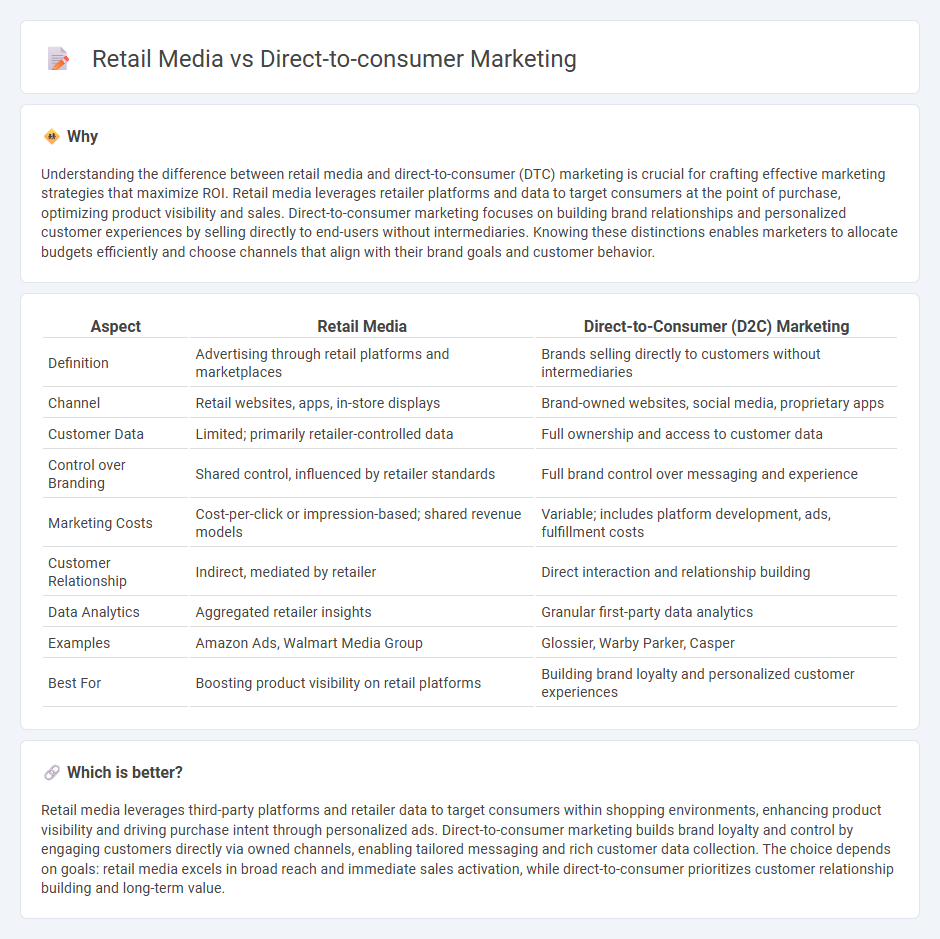
Retail media leverages third-party platforms and digital retailers to target consumers at the point of purchase, driving sales through sponsored ads and product placements. Direct-to-consumer marketing bypasses intermediaries, enabling brands to build stronger customer relationships and collect first-party data via ecommerce websites and social channels. Explore how these marketing strategies optimize brand visibility and consumer engagement in today's competitive landscape.
Why it is important
Understanding the difference between retail media and direct-to-consumer (DTC) marketing is crucial for crafting effective marketing strategies that maximize ROI. Retail media leverages retailer platforms and data to target consumers at the point of purchase, optimizing product visibility and sales. Direct-to-consumer marketing focuses on building brand relationships and personalized customer experiences by selling directly to end-users without intermediaries. Knowing these distinctions enables marketers to allocate budgets efficiently and choose channels that align with their brand goals and customer behavior.
Comparison Table
| Aspect | Retail Media | Direct-to-Consumer (D2C) Marketing |
|---|---|---|
| Definition | Advertising through retail platforms and marketplaces | Brands selling directly to customers without intermediaries |
| Channel | Retail websites, apps, in-store displays | Brand-owned websites, social media, proprietary apps |
| Customer Data | Limited; primarily retailer-controlled data | Full ownership and access to customer data |
| Control over Branding | Shared control, influenced by retailer standards | Full brand control over messaging and experience |
| Marketing Costs | Cost-per-click or impression-based; shared revenue models | Variable; includes platform development, ads, fulfillment costs |
| Customer Relationship | Indirect, mediated by retailer | Direct interaction and relationship building |
| Data Analytics | Aggregated retailer insights | Granular first-party data analytics |
| Examples | Amazon Ads, Walmart Media Group | Glossier, Warby Parker, Casper |
| Best For | Boosting product visibility on retail platforms | Building brand loyalty and personalized customer experiences |
Which is better?
Retail media leverages third-party platforms and retailer data to target consumers within shopping environments, enhancing product visibility and driving purchase intent through personalized ads. Direct-to-consumer marketing builds brand loyalty and control by engaging customers directly via owned channels, enabling tailored messaging and rich customer data collection. The choice depends on goals: retail media excels in broad reach and immediate sales activation, while direct-to-consumer prioritizes customer relationship building and long-term value.
Connection
Retail media leverages retailer-owned digital platforms to target consumers with personalized advertisements, driving direct engagement and seamless purchase experiences. Direct-to-consumer (DTC) marketing benefits from retail media by gaining access to rich consumer data and real-time shopping behaviors, enhancing targeting precision and conversion rates. This synergy maximizes brand visibility and sales by integrating advertising efforts directly within the customer's shopping journey.
Key Terms
Customer Acquisition
Direct-to-consumer marketing leverages personalized digital channels to target and acquire customers directly, enhancing brand loyalty and data collection efficiency. Retail media focuses on advertising within retail platforms, driving purchase intent by reaching shoppers at the point of sale and capitalizing on first-party retail data. Explore the differences and strategies to optimize customer acquisition in both channels.
First-party Data
Direct-to-consumer marketing leverages first-party data collected directly from customers to create personalized and targeted campaigns, enhancing customer loyalty and conversion rates. Retail media relies on retailer-owned first-party data, utilizing insights from shopper behavior within e-commerce platforms to optimize ad placements and drive in-store and online sales. Explore how harnessing first-party data in both strategies can maximize marketing effectiveness and ROI.
Omnichannel Strategy
Direct-to-consumer marketing enables brands to build personalized customer relationships by leveraging first-party data across digital platforms, while retail media focuses on targeted ads within retailer environments to drive immediate purchase behavior. Integrating both approaches within an omnichannel strategy maximizes touchpoints, ensuring seamless brand experiences whether consumers shop online, in-store, or via mobile apps. Explore how combining DTC and retail media can elevate your omnichannel marketing effectiveness.
Source and External Links
What Is Direct-to-Consumer Marketing? - NerdWallet - Direct-to-consumer (D2C) marketing is a strategy where companies sell products or services directly to consumers, eliminating intermediaries like retailers, which allows full control over branding, customer experience, and data collection to improve offerings and loyalty.
Direct-to-consumer - Wikipedia - Direct-to-consumer is a retail business model bypassing third-party retailers, mostly using online sales but sometimes combined with physical stores, with its popularity rising significantly since the dot-com era to modern e-commerce, exemplified by brands like Warby Parker and Dollar Shave Club.
What is DTC marketing? Tips, strategies, and examples - Omnisend - DTC marketing promotes products directly to customers through personalized, proactive channels such as social media, email, and SMS, providing brands with greater control over pricing and customer relationships but requiring management of the full sales process including shipping and service.
 dowidth.com
dowidth.com